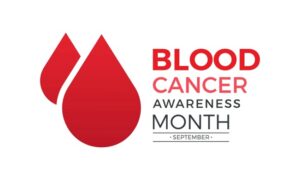Learn what Blood Cancer is and how it is Diagnosed and Treated this Blood Cancer Awareness Month
October is Blood Cancer Awareness Month, a time dedicated to raising awareness about blood cancers such as leukemia, lymphoma, and myeloma. While these conditions primarily affect the blood, bone marrow, and lymphatic system, they can also have implications for other organs, including the liver. Understanding the connection between blood cancer and liver health is crucial, especially for those who may need the expertise of a hepatologist in New Jersey.

What Is Blood Cancer?
Blood cancer occurs when abnormal blood cells begin to grow uncontrollably, interfering with the production and function of normal blood cells. This disruption can affect the body’s ability to fight infections, carry oxygen, and prevent excessive bleeding. There are three main types of blood cancer:
1. Leukemia: Affects the blood and bone marrow, leading to the overproduction of abnormal white blood cells
2. Lymphoma: Targets the lymphatic system, which is part of the immune system, and involves abnormal lymphocytes (a type of white blood cell)
3. Myeloma: Affects plasma cells in the bone marrow, disrupting the production of antibodies that fight infections
How Is Blood Cancer Diagnosed?
Diagnosing blood cancer typically involves a combination of tests and examinations. These may include:
• Blood tests: A complete blood count (CBC) can detect abnormal levels of blood cells, which may indicate blood cancer
• Bone marrow biopsy: A sample of bone marrow is examined to identify the presence of cancerous cells
• Imaging tests: CT scans, MRIs, and PET scans can help visualize the extent of the cancer and whether it has spread to other organs, including the liver
• Lymph node biopsy: If lymphoma is suspected, a biopsy of an affected lymph node may be performed
How Is Blood Cancer Treated?
The treatment of blood cancer depends on the type, stage, and overall health of the patient. Common treatments include:
• Chemotherapy: The use of powerful drugs to kill cancer cells or stop their growth
• Radiation therapy: High-energy radiation is used to target and destroy cancer cells
• Stem cell transplant: Replaces damaged bone marrow with healthy stem cells, either from the patient or a donor
• Targeted therapy: Uses drugs that specifically target cancer cells without affecting normal cells
• Immunotherapy: Boosts the body’s immune system to fight the cancer
The Role of a Hepatologist in Blood Cancer
A hepatologist in New Jersey can play a vital role in managing liver-related complications that may arise from blood cancer or its treatment. Certain blood cancers, such as lymphoma, can directly affect the liver. Additionally, treatments like chemotherapy can have hepatotoxic effects, making liver monitoring and care essential. Regular liver function tests and consultations with a hepatologist are crucial for patients undergoing blood cancer treatment.
During Blood Cancer Awareness Month, it’s important to stay informed about the symptoms, diagnosis, and treatment options available. Early detection and a multidisciplinary approach, including the involvement of specialists like hepatologists, can significantly improve outcomes for those affected by blood cancer. The Medical Group of New Jersey is here to provide comprehensive care and support for all aspects of your health.